[This post may contain affiliate links where we earn a small commission. Please see our disclosure for more information and thank you for supporting our site so we can continue to bring you awesome content for your travel inspiration!]
As a soon to be Mom of three, this will actually be my second baby born in Germany (my first was born here, my second back in the US and now we are back in Germany for Baby Girl). So, not only is this not my first rodeo, but I also have the comparison of German prenatal care and births vs US. I’ve also had one C-Section and one Vaginal birth in Germany as well as 2 VBACs total now, so hopefully, I can give you enough scope and reference to cover some informational ground to help you out on your pregnancy journey in Germany!
Alright, alright, I know this is a TRAVEL blog, but we actually have a ton of US Military stationed in Germany and Expat followers alike that I decided to go rogue today and instead of talking about travel in Germany, I thought I’d give some behind the scenes info on life as an Expat here, specifically what a pregnancy in Germany (and birth) is like. After all, I have found that giving birth in Germany as a foreigner isn’t as straightforward as pushing for a few hours and ta-da! Your little miracle is here! Like most life as an expat in Germany, there are some nuances, hoops, and things you need to know.
So let’s start at the beginning
You'll Find In This Article:
Congrats! You are Pregnant in Germany!!!

Well….at least you THINK you are. After all, why are your boobs suddenly super tender and ugh, why is the wafting smell of that delicious cappuccino suddenly making you want to gag!?
Time to take a pregnancy test. Just like in the US, this is decently straightforward. You can get a pregnancy test at any Apotheke or even at places like DM or Rossman.
Unlike in the US where you are often told to wait until 8-10 weeks for even your very first appointment, as soon as you find out, you can usually get a confirmation (and most likely ultrasound) ASAP with an OB here.
The Healthcare in Germany
I’m always blown away by the healthcare in Germany. Sure, every system has its downfalls, but I’ve always found healthcare to be outstanding here, and being pregnant in Germany was no exception to this. You can expect some of the best healthcare when it comes to pregnancy and birth in Germany. My only complaint is that your OB appointments can take what feels like forever to get in, even with a scheduled appointment. Plan on a minimum of a few hours, just to be safe.
And the cost!? The cost of having a baby in Germany is outrageously low, even for those without insurance!!!
Picking Your OBGYN
First, a few things to know about the OBGYN system here in Germany, as this is one of the biggest differences between giving birth in Germany vs. the US.
- Your Doctor Won’t Be Delivering Your Baby: Say whaaaaat!? When I was giving birth in the US, I can’t tell you the number of hours I spent researching local Doctors to decide on the best fit. For me, this meant I needed to find someone who was not only going to support me but be an advocate for my VBAC (Vaginal birth after cesarean) and I needed a Dr who was ok with me doing a Hypnotic Childbirth (yup…Hippie alert!). I wanted to be close enough to home, but yet know that there was a superb NICU (just in case) at the hospital that my Dr had delivery privileges at…..and on and on went my list.However, in Germany, the OBGYNs that you are going to see for 9 months is “simply” your prenatal care. The only caveat to this is that some hospitals have an OBGYN staff that may do deliveries. (But more on WHO is in the delivery room with you below….) All doctors will have had to have had time being a delivery doctor in a hospital (this is part of their degree). However, many then go on to practice in a private practice, so then they have zero affiliation with the hospital and deliveries. A nice benefit of this is that you won’t ever feel pressure from your German Dr because s/he is on call or wants to be done with a shift. They could care less when you actually deliver (Well, obviously within safety measures!)
- Many (but not ALL) Doctors Speak English: Here in Regensburg, where I live, it wasn’t difficult to find an OBGYN who not only speaks English but speaks English quite well. If you speak German, this may not even be an issue for you, but when it comes to medical terminology and (with my first) just being pregnant for the first time and not knowing anything about pregnancy and birth, I wanted to make sure that language was not a barrier.
Tip: Find some English-speaking groups online (even better if they are Mama groups) for your local area and ask around for personal recommendations. Otherwise, you can simply reach out to individual doctors and ask if they speak English.
What’s All This Talk About Midwives?
In the US, a midwife is (sometimes) a more “alternative” route to a traditional OBGYN. While midwifery is slowly starting to become more common again in the US (even at hospitals), for quite a while, having a midwife in America might have also meant you were planning on a homebirth.
Here in Germany, midwives are a bit different:
- A midwife won’t replace your OBGYN. So, typically, you will find a midwife who will do the majority of your prenatal care and exams. However, you are still expected to have an OBGYN and you will still be “required” to see that Doctor for things like the 20 week scan
- That midwife that you are seeing during your pregnancy in Germany won’t actually be delivering your baby (unless you are having a homebirth).
~This was the part that was so confusing to me. Why establish rapport with a midwife if I’m still required to occasionally see an OBGYN AND she won’t even be at my delivery!? (So again….who DOES deliver the baby??? Keep reading!) - MUCH more common than a midwife that you have throughout your entire prenatal care is a midwife for the last few weeks of pregnancy throughout your postnatal care. I’ll go into more detail in a bit on this below, but you will want to find and book one as soon as possible.
- If you ARE planning on a homebirth in Germany, you need to secure a homebirth midwife like…. yesterday. Not all midwives do deliveries and not all midwives that do deliveries do homebirths. So, depending on your location, you may have only a few options. I started contacting homebirth midwives here when I was just 5 weeks pregnant (some women don’t even KNOW they are expecting yet!) and the very few local (homebirth) ones were already booked or unavailable!
Tip: Do NOT wait to get your midwife in Germany, whether it is for prenatal care, a homebirth, or post natal….they book up FAST!
A good site to use to find a German Hebamme (midwife) is https://www.hebammensuche.de/. You can sort it by your location and even input language preferences and what kind of midwife you are looking for. Another site you can search on is https://www.gkv-spitzenverband.de/service/hebammenliste/hebammenliste.jsp
What About a Doula?
So, again, in the US if you are opting for a more natural birth, having a doula has become much more common. I personally feel that this is because most hospital births now see so few natural births that they often don’t know all the different ways that a mother can find comfort and a doula is a perfect person for that.
However, since Midwives and natural births are the norm here (more on this topic below), doulas aren’t all that common (although they are starting to pop up more and more)
Tip: Find a German Speaking Doula! If your German isn’t fantastic (like mine isn’t), then having a German (or German/ English speaking Doula) is a fantastic way to break the language barrier. My doula for this last birth is a German who speaks fluent English. This was a huge relief for me so that I knew that language would be one less thing to worry about in potentially intense moments.
Finding A Doula In Germany
- Simply do a google search for your local area + doula (IE “Munich Doulas”) and you might be pleasantly surprised at your options
Tip: If you are looking for a doula, look around the US Military communities. Doulas are pretty common with Americans, and since there is a strong US Military presence (particularly in Bavaria and in the Ramstein area), if you are around those areas, you’ll have a good chance at finding one. For example, there is a network of Americans that have the Doulas of Bavaria group and there are also several in the Ramstein/ KMC area as well
Choosing a Hospital to Give Birth in Germany
Depending on your location, this may be more straightforward than others. Of course, you can look for a Geburtshaus (birthing center) or even have a home birth, but if you know you will be having a hospital birth, here are a few things to consider:
NICU: They aren’t called NICUs in Germany, but just like in the US, not all hospitals have a Neonatal Intensive Care Unit and not all hospitals that do have ones are the top tier. That doesn’t mean they aren’t good, it just means that other hospitals have much higher level trained staff, different equipment, etc in the case of emergencies.
***Know: If you give birth at a hospital that does not have a NICU and, for whatever reason, your baby needs one, you will NOT be transferred to that hospital with your baby! What that means is that your baby will be rushed to the other hospital that has intensive care but you will remain at the one you birthed at until you are discharged. Then, you will not be able to transfer and stay in the hospital at the new one, meaning you’ll have to come in daily rather than just already being there.
“Baby Friendly” Certifications: There is a certification at some hospitals to be “Baby Friendly” and what that means is that they do less interventions during birth and things like formula and pacifiers aren’t even an option afterwards. If you are looking for a natural birth and there are no birth centers, this is a good middle ground.
Location: It probably goes without saying that location is a popular thing to consider when choosing your hospital. For my first birth, I had to go about 40 minutes to get to the hospital, as this was the closest option.
Pregnancy in Germany
1) Your Mutterpass is GOLD
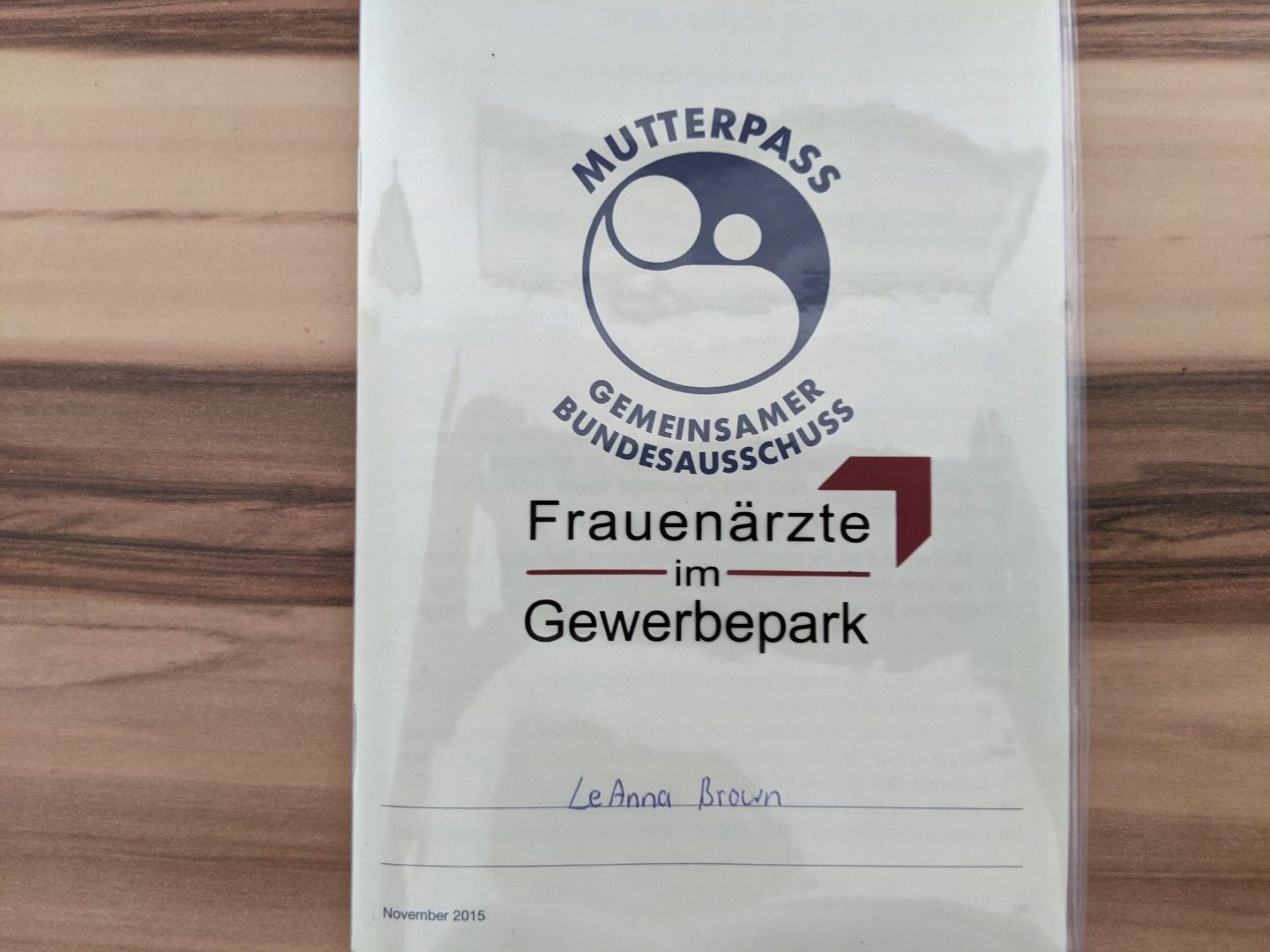
At that very first Doctor’s appointment, you are going to be handed your motherhood BIBLE. Don’t you dare even think about showing up to future appointments without this precious piece of documentation in hand!
I actually liked having this because in these little booklets hold EVERY piece of information about your pregnancy possible. No guessing, having to call the office to get numbers, and if you need to switch providers, it’s all packaged neatly so you don’t have to worry about getting your medical records. In it are things like:
- Your medical (and birth, if applicable) history
- Weight
- Medications
- Blood work numbers
- Routine pregnancy test outcomes (Gestational Diabetes, Strep B, etc)
- And soo much more
2) You’ll Get Ultrasounds at Every Appointment
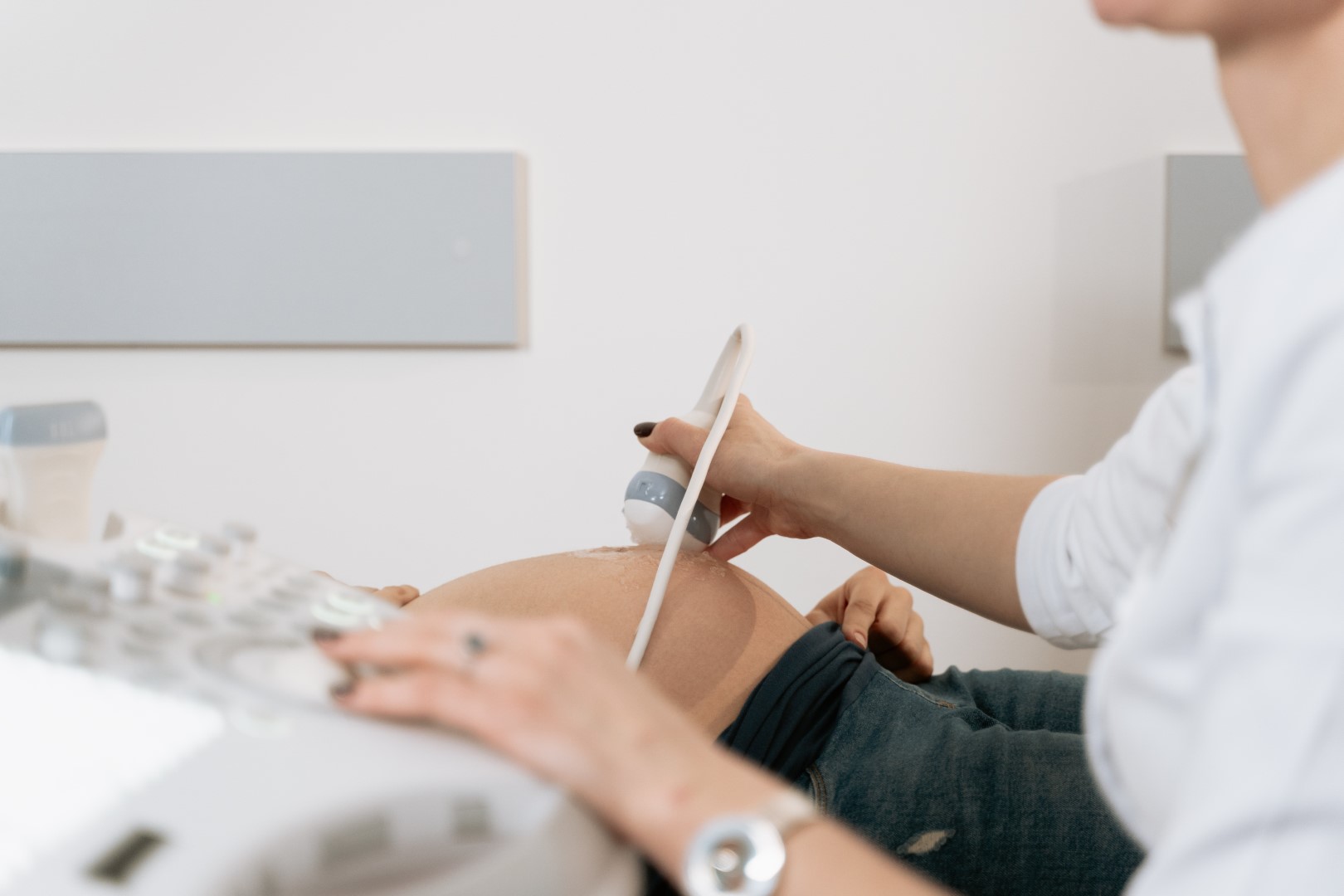
In the US, you might get an early scan, one at 20 weeks and if you are lucky, one in later pregnancy. But here in Germany, they give out ultrasounds like they give out beers at a fest! (Damn I wish I could have a Fest Bier right now!)
While I actually am a very hands off person when it comes to pregnancy (did you not see my “hippy” comment above?) I actually really liked having an ultrasound every month. I know I know….my crunchy friends will all shrivel up and squeal “We don’t know the effects with that many ultrasounds!!!” and they may even declare that that much early intervention can be ripe for misinterpretation leading to unnecessary interventions, but, like most things German, they are THOROUGH!
This meant that at each appointment, they looked carefully for different markers and things to document. Yes, judging the weight and size of a baby by ultrasound can be drastically off, but it was always a relief to have the placenta checked or to make sure that the umbilical cord was not wrapped, or to check that there was still a good amount of amniotic fluid, etc. In fact, I often joked that my appointments in the US were a waste of time and “what were they actually doing” besides checking my weight and asking how I was feeling??
3) Don’t Be Shy
So, given my hippy ways, I don’t fear nudity that much and living in Germany for so many years, I totally understand that nudity does NOT equal sexuality here.
But that didn’t stop my American mind from glancing around for a cover, blanket, or hospital gown the first time my doctor told me to disrobe for a vaginal ultrasound. I cautiously walked across the room, which wasn’t large but suddenly felt enormous, buns out, over to the exam table. There, we continued as if my lady bits weren’t totally exposed.
Sometimes, they will remember that Americans are a bit more “prudish” and will ask if you feel more comfortable with a cover. However, most of the time, you’ll just be walking around pants-less like it’s no big deal (and at the end of the day, it really isn’t)
I mean, it all makes sense; they are Doctors who see a vagina every single day. We are women, we’ve all got them….so who really cares!?
4) You Might Have to Fight for Anti-Nausea Meds
With my first son, the nausea started around 8 weeks. And then it just took a nose dive from there. I could barely smell a food without needing to run to the bathroom. Poor hubby slaved over a homemade sweet and sour chicken one night and I took one whiff and begged him to take it away!
“Oh, nausea can last until about 12 weeks,” said my Dr.
Ok yeah, cool….I’ll just be miserable until then I guess.
But then 12 weeks came and went and things were getting worse, not better. “Ah, yes, some women, unfortunately, will be sick until 18-20 weeks” he claimed at one point.
And so, 20 weeks flew on by and here I was, barely able to get out of bed. But hey….this was my first, so what did I know!? Plus, I was thinking “the less meds in my system, the better for baby.”
FINALLY at 26 weeks, the nausea started to fade little by little each day until finally, one morning I thought, “I need a coffee!”
Flash forward to my third pregnancy (yup, my second was no better with morning all day sickness) and at 6 weeks, when I was already down for the count with two other little ones now running circles around me, I knew I couldn’t do this with no meds. I begged and pleaded for SOMETHING and so he started me on “Vomex.” This is a very common drug in Germany to help with nausea.
And it didn’t do a damn thing.
After having to go into the ER for IV fluids from dehydration, I begged for something stronger.
He hesitantly said we could try to get “Agyrax” but that we’d have to order it from the UK or France, since it wasn’t sold in Germany. That medicine took the edge off….a little.
Finally by week 10, when I couldn’t even parent my other kids, I said I NEEDED Zofran. (I had always avoided it previously but I can’t just let my 2 kids under 5 watch Paw Patrol ALL day while I was laid up in bed!) He resisted the first few times I requested but eventually gave in. It is EXPENSIVE here in Germany (like 40 Euro for a small box of 10 or something like that) but it was the only thing that made me slightly human until almost 20 weeks.
Moral of that long story? They won’t just give out anti-nausea medicine willy nilly and you WILL have to go through several lower level intervention ones “proving” they don’t work before getting anything stronger.
What To Expect At Your Appointments
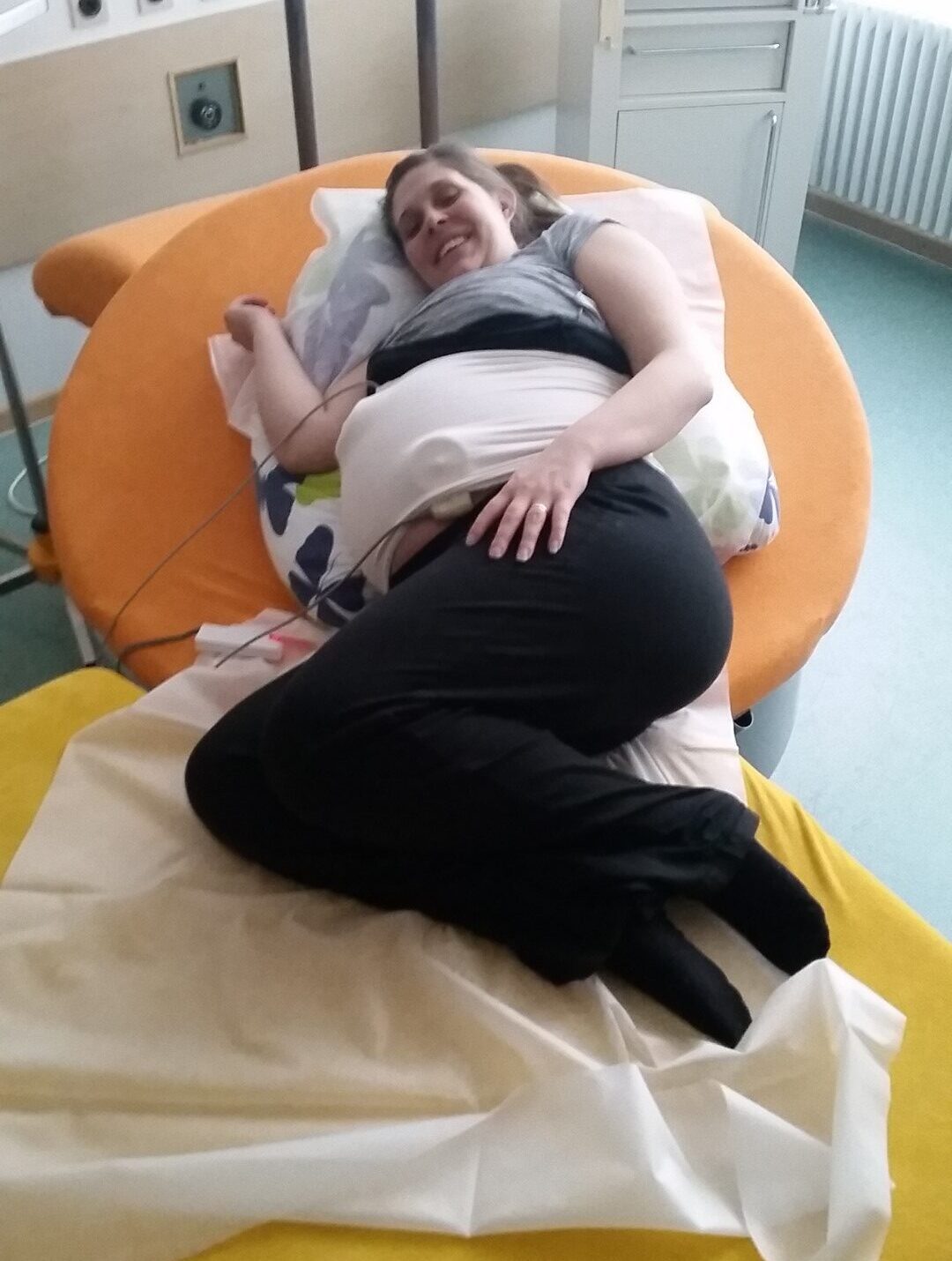
Just like in the US, you’ll have a monthly exam. At each appointment, you’ll give a urine sample (they will test for things like dehydration, protein in the urine, which could be signs for things like Gestational Diabetes or Pre-Eclampsia), and your weight will be taken. Occasionally, bloodwork will be sampled as well (and is usually noted when that will happen in your Mutterpass schedule).
Then at every appointment, you’ll most likely have an ultrasound.
Just like in the US, you’ll have a Gestational Diabetes test done. Each time I did it in Germany, it was the 1-hour test where fasting was not mandatory, but obviously, it’s best to ask.
Starting at 32 weeks, you’ll start to go twice a month instead of once every 4 weeks. You’ll start CTG monitoring at this time as well where they’ll be checking on baby’s heart, for contractions, etc. These appointments take a little longer since the monitoring is an additional 20-30 minutes.
Expect To Go Full Term
(Unless there are medical reasons otherwise)

The childbirth education program I did (Hypnobabies) calls it a “Guess Date” and I absolutely LOVE this!! I am an absolute birth junkie, so I’m in about a million “Mom support groups” or “Moms to Be” style forums and I can’t tell you the amount of women who are like “I am 39 weeks, why isn’t this baby here yet…I’ve tried everything!”
Don’t get me wrong, Mama, I know just how difficult those last weeks (ahem…months!) can be! Whether it’s physical discomfort, the impossibility of finding comfort while you sleep, having to pee no less than a million times a day, or if it is just the sheer excitement of wanting that precious baby in your arms, those last few days and weeks can feel like an eternity!
However, if you’ve been in Germany for any amount of time, you probably already know that Germans are much more holistic and take a hands off approach to medical intervention unless necessary (which is why I find the ultrasounds at every appointment a bit of a contradiction). And yes, this absolutely includes birth!
Inductions are Not Common
You will find that a German Doctor will NOT induce for anything other than an immediate medical necessity or unless you are at 42 weeks. Big baby? Tough it out. 41 weeks pregnant? You still got another one to go!
In fact, at 41 weeks and 5 days my doctor FINALLY discussed an induction….and that was ONLY because my baby was breech!
Most of the time, induction prior to 40 weeks (and often even 41 weeks) will not be approved by a German Dr unless you or the baby are at risk for something specific.
Giving Birth in German Hospitals
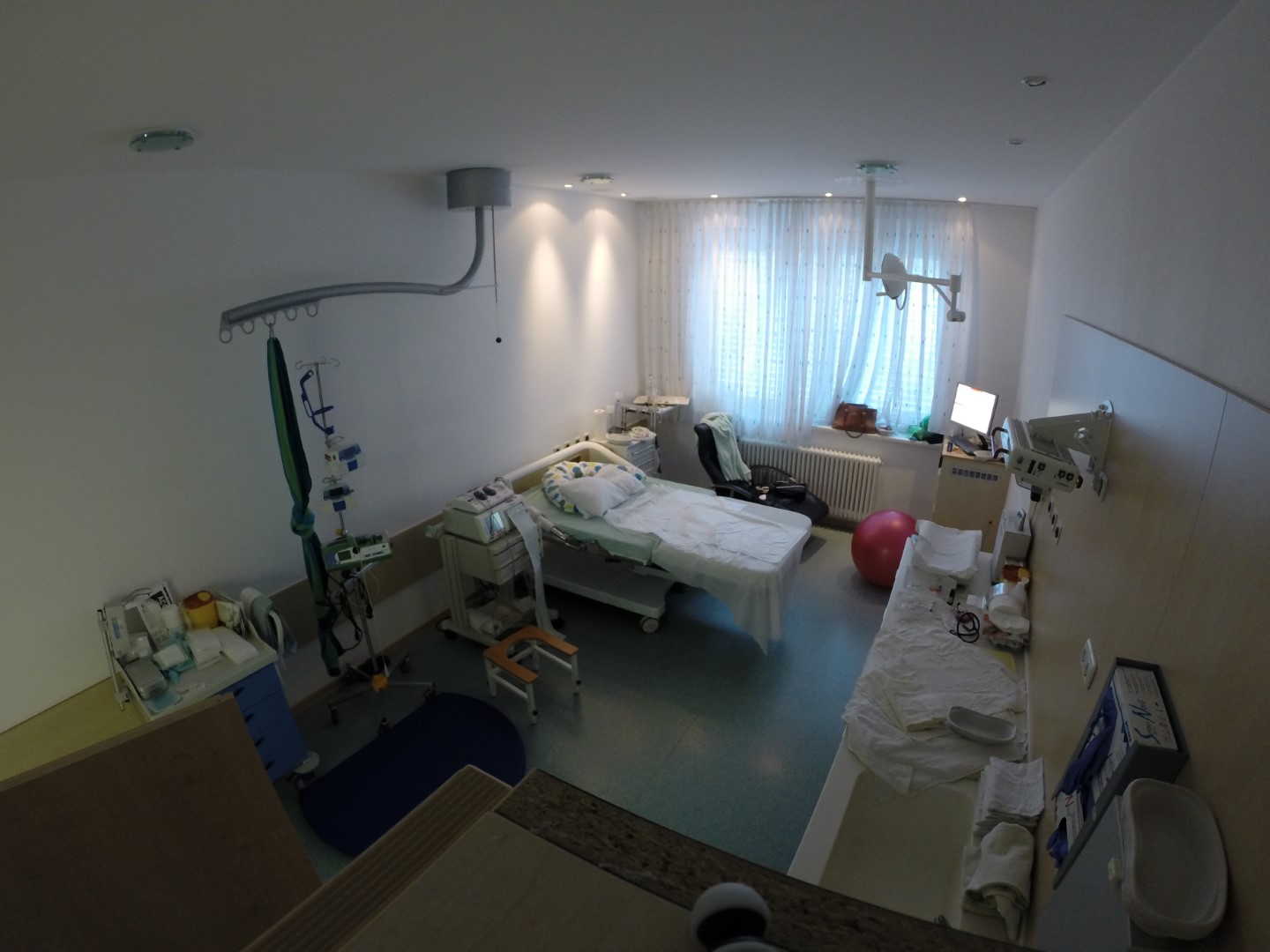
Depending on where you live, you may have access to a local birthing center (Geburtshausgeburt), which is a bit more homely feeling than an actual hospital, however, they have everything a hospital would have….minus an operating room and NICU.
Otherwise, you can choose to have a homebirth with a midwife or a hospital birth.
So here’s where things really get interesting. I found hospital births SO different in the US vs Germany. Some really great differences, some not so fantastic.
1) Back To the Basics Of Birthing
Since I obviously am a crunchy mama to begin with, the idea of having a natural birth was actually one I would have chosen whether I was in the US or in Germany. So, when I was told that the Germans were VERY pro- natural birth, I was excited. I had heard horror stories of women having to fight for things like declining inductions or interventions in the US and was relieved that I probably wasn’t going to have to encounter that in Germany.
So, what does this mean?
In addition to epidurals not being commonplace, you’ll have a midwife with you (more on both of those points next). These women are fantastic at helping to facilitate a more comfortable birthing experience through techniques such as body positioning, acupuncture, massage techniques, utilizing hydrotherapy, offering aromatherapy, and much more! Take them up on ANYTHING they offer! That’s what they are there for!
2) No Epidurals
Ok, Ok….this is not a hard and fast rule. In fact, epidurals are becoming a bit more common in Germany. HOWEVER, if you know that you want one, I was advised that you need to make this clear at your registration as well as the second you arrive for your birthing time. DO NOT just assume that they will ask you because, in Germany, the assumption is that you WILL NOT be getting one.
Most hospitals in Germany also have two kinds of epidurals
- Walking: This epidural is a shot into the lower spine. “Walking” is a bit misleading because while some mothers may be able to shift around or even get on all fours, I wouldn’t expect to actually be able to be up and walking. This epidural often can cause headaches in mothers as well.
- Spinal: This epidural is placed directly into the spine with a catheter, which the medicine can then be adjusted as needed. There will be no movement from the birthing mother from about the belly down as all sensations will be blocked. Most likely, if you get a Spinal Epidural in Germany, it will be for a C-Section
3) The Midwives Will Deliver the Baby, Not a Doctor
FINALLY! I get to the answer of who gets to deliver that little miracle! But wait, you thought I said that the midwives don’t deliver….
Well, the ones you hire privately for things like post and prenatal care don’t.
Instead, the midwives are kind of like what we would think of as Labor and Delivery Nurses in the US (but with an actual midwifery certification) but instead of also needing a doctor in the room to deliver, they can do that as well.
So, there is a set of midwives at each birthing hospital and they work in shifts. So, it’s really the luck of the draw on who you get. You don’t get to schedule your favorite midwife, and you may not even know any of them prior to the big day.
You’ll arrive and just like getting assigned a Labor and Delivery nurse, you’ll get assigned a midwife. If you are oh so blessed (that’s pure sarcasm) with a long birthing time like my first one was, you’ll have your first midwife, her shift will end and a new one will take over, and then the original one will be back finally by the time of birth! (yeeeeah…..let’s NOT have a 40 hour birthing time again!)
To have a Doctor Present: Like most things with birthing in Germany, I do offer a caveat! For high risk births as well as those with private insurance, you can opt much more easily to have a Doctor actually be there to deliver the baby. However, most people would argue that for low risk births, the midwives are fantastic and a doctor isn’t even necessary.
Tip: Bring Your Own Birthing Gown: Personally, I’ve always just been but naked or in comfy clothes/ sports bra during my birthing times, which is exactly the way I like it. While they will probably have a scratchy, uncomfortable gown somewhere to loan you, it’s not common for these to be provided. Therefore, if you want to be covered or in a comfy birthing gown, bring your own or get a beautiful one like this ahead of time.
How To Have a More Comfortable, Natural Birth

Many women are a bit nervous about having a natural birth in Germany. So, what can you do to prepare?
- Trust Your Midwives: Have I freaked you out yet about having a natural birth? Hopefully not! Remember, the German Midwives see more natural births than medicated, so they know exactly what to do to help with pain management! And since natural births are the norm, each Labor and Delivery Room is decked out with natural birthing equipment. You’ll have access to birthing balls, ropes, birthing stools, tubs, showers, and so much more to help.
- Take a Childbirth Prep Course That Caters To Natural Birthing: There are so many great birthing courses out there, and so many of them really cater to women wanting a NATURAL birth. I decided to go with Hypnobabies for each and every one of my births. Despite all three being very different birthing experiences. I can’t even put into words how essential doing a childbirth hypnosis course was for me. I hate to use the term “Pain Free” when it comes to childbirth because I don’t want to set up unrealistic expectations, buuuut for my second child I only felt intense pressure for my entire birthing time. It was only during pushing that I felt I was in “pain” and even then, felt in control the entire time.Click Here To Purchase The Hypnobabies Homestudy or See If There Are Any In Person Classes In Germany Near You.
Post Natal Care/ Staying In the German Hospital After Birth
So, this is the ONE area that I would say gets the most complaints from Americans. Therefore, I think it’s best to just remember you are NOT in the US, go in with an open mind, and come to the hospital prepared!
1) Be Ready To Share a Room
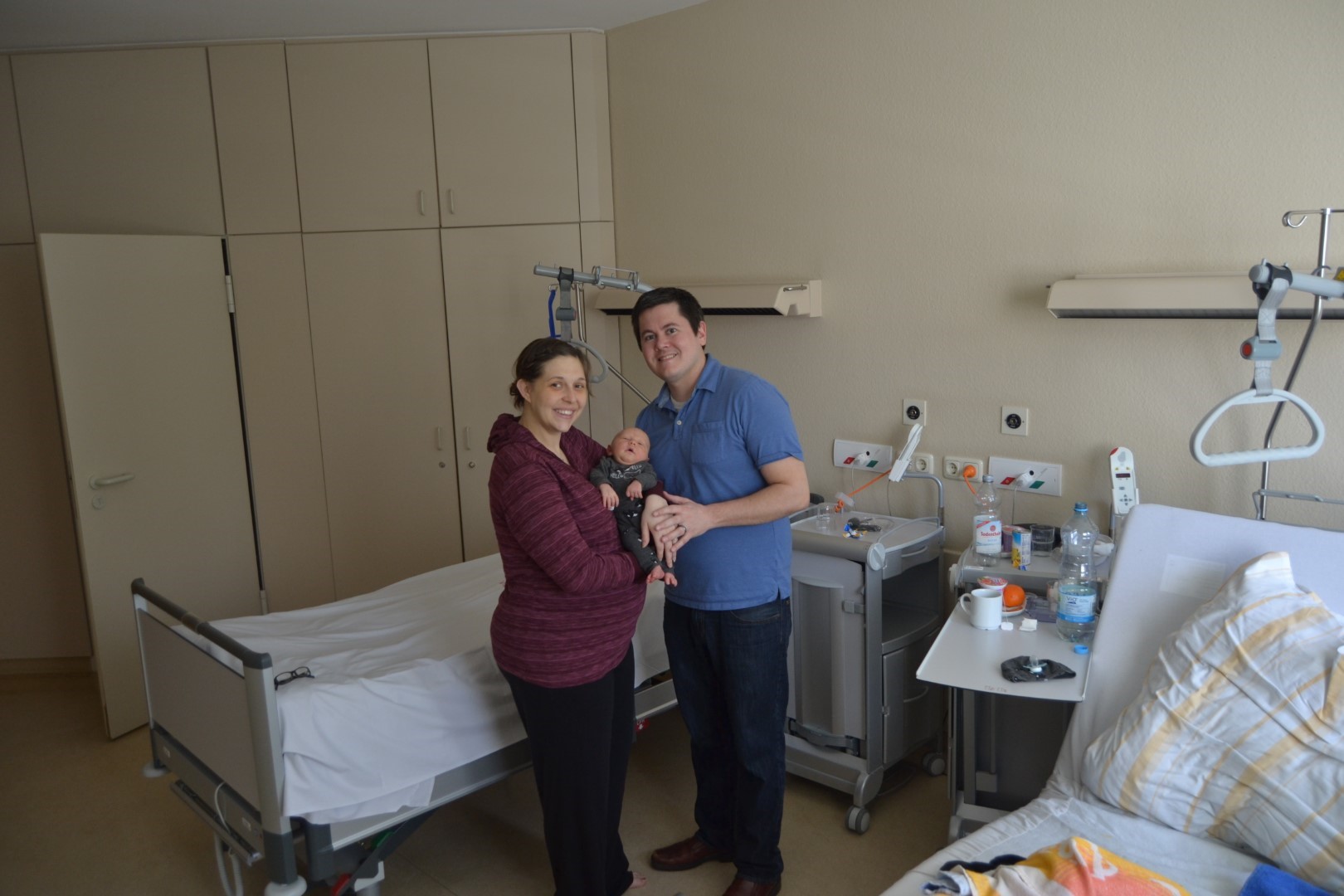
This probably is my personal biggest complaint about having a baby in Germany. Giving birth is freaking hard work. And as a first time Mom, I was pretty clueless to actually BEING a mom to this tiny human I didn’t even know.
So, being put in a small, hospital room with another mom and her newborn baby was pretty frustrating. This meant:
- Your Partner Can’t Stay: In the US, we had a big, beautiful (almost hotel feeling!) room where the couch pulled out into an (uncomfortable) bed where my husband could spend the night and stay with me the entire time in the maternity ward. However, in Germany, since you are sharing a room, this isn’t even an option. There are visiting hours and partners have to leave over night.
- You Have To Deal With YOUR Newborn Baby AND a Strangers: I actually had a really pleasant mom as a roommate when Lil B was born! However, as first time moms ourselves, it was quite frustrating when you JUST got your baby to sleep finally, and then theirs wakes up. Obviously, it’s not like you can be mad at a 1 day old baby for crying! But it was just hard mentally and emotionally when you are trying to bond and there are constant distractions, noises, and strangers up in your personal space.
Tip: See If Your Insurance Covers a Private Room. SOME hospitals MAY have the option of a private room and many private insurances will offer to cover this. So, for somewhere around 50-100 Euro/night (give or take), you might be able to get a private room and if so, it would be worth every penny (erm, Euro Cent).
HOWEVER, know that even if a hospital offers private rooms, you aren’t guaranteed one. For example, even though I requested one for our birth, there was literally a baby boom at the time. They take the private rooms and make them just another shared maternity room, so despite me asking daily, there weren’t even any offered during that baby rush. Alternatively, if they are all already taken (there are typically only a few at each hospital) then that’s that.
2) There is No Air Conditioner
For my first son, he was born in April, so I wasn’t overly concerned with the heat. However, baby girl is due in early September (August if she comes early) and I was dreading being in a hot, stuffy, small hospital room after doing one of the hardest things a human body can endure.
Tip: Many moms will bring a small beside fan. Others like to bring a handheld fan as well. The handheld fans are especially nice during your actual birthing time.
3) The Food Debate
In the US, the food debate is “Can I eat during my birthing time” but that’s a total nonissue in Germany (YES! You can!) No, instead the debate is amongst Americans and Expats on if the food in the hospitals is good.
Some say it’s fantastic! Others can’t order a Doner fast enough and swear they can’t survive on what is provided. I find this is a very cultural thing and has more to do with how a German traditionally eats their meals in a day compared to an American (which funnily enough IS very different!)
After Birth: If you gave birth after the kitchen is closed. Tough luck. In the US, I gave birth late at night and was still offered a “Brown Bag” lunch style meal in recovery (I swear that wonder bread, ham sandwich, and pudding cup could have been 5 star gourmet food right there!!!) But here in Germany, if the kitchen is closed. It’s CLOSED! Therefore, absolutely make sure you have some sort of small “meal” packed (again, even something as simple as a sandwich, chips, apple, and pudding) because you will be ravenous after birth!
Breakfast: You’ll get a very “typical” style breakfast for Germany, so think a roll or so with a slice or two of deli meat and/or jam, coffee, juice, and maybe a yogurt. Many women claim this doesn’t meet their expectations (as they are used to a more “American breakfast” (I got cinnamon rolls and biscuits and gravy with my US birth!!) ) so again, go in with realistic expectations.

Lunch: For Germans, lunch is often their “hot meal” of the day and it’s not uncommon for this to typically be their largest meal of the day as well. Therefore, I LOVED the lunches at the German hospital, just be prepared for it to be well….German food, of course! I had Schnitzel one day and Rahmschwammerl another! Of course, there’s always a soup as well! I’ve seen other moms talk about spaghetti, lasagna, currywurst, etc. In the picture below, you see the full currywurst mit pommes, an orange, a salad, and the soup.
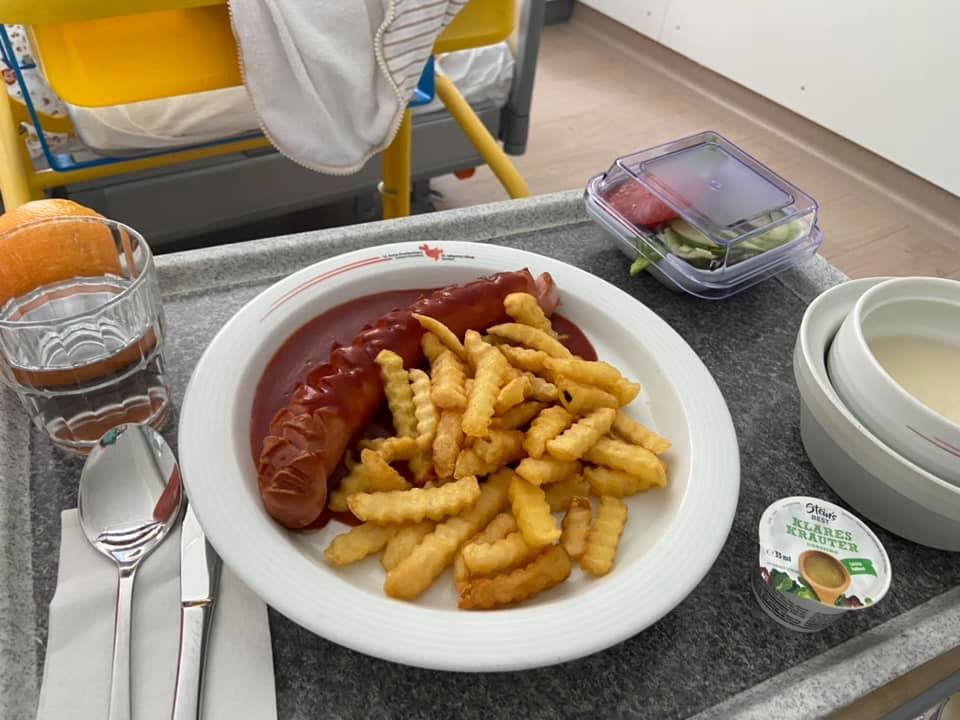
Dinner: Many non-German moms will complain a bit about the dinners as well. Again, the lunch is the main meal, so you are back to more of a “Brotzeit” style of meal. Think a bread roll, a slice or two of meat, etc.

Tip: If you plan on staying, bring lots of snacks and “easy to make” foods! I literally brought an entire package of sliced bread with a jar of peanut butter and jelly! I had heard so many people complain about the food, I was NOT about to go HANGRY! (I personaly ended up not touching any of my own because I was perfectly content with what was offered actually). Other things you can bring are easy heat up items (most hospitals have a microwave you can use), granola bars, cookies (hey, you deserve them, Mama!!!), and anything else that is shelf stable and easy to grab n go.
Alternatively, ask your hospital if they have a problem with you ordering take-out food or having your partner bring in take-out. Food delivery services are so much more common now in Germany and so this is another option if your hospital is ok with that. The night I was induced I chowed down on a fantastic gnocchi dish from a nearby Italian place because the hospital food just wasn’t cutting it that night for me.
4) Water and Ice

Another funny discussion many expats have is on the topic of water. If you’ve lived in Germany for even a few seconds, you know the Gemans just loooove their “Wasser mit gas” and if you’ve lived in Germany for more than a minute, you know that they often frown upon tap water, and even (gasp!) worse, tap water from the bathroom!!!!
After you have your baby, you are going to be absolutely parched! And if you are like me, while I love “bubbly water” it just doesn’t quench my thirst. I asked my nurse for some “Still Wasser, bitte” and low and behold, it was still just a low carbonated water. I mean, how can they not have normal water!? So, into the bathroom I went to fill up my water bottle to the absolute horror of my nurse. #Sorrynotsorry
So, if you want still (non carbonated) water, either bring your own bottled water or be prepared to be looked upon like the heathen you are, drinking tap water from the bathroom sink!
And just like carbonated water, if you have lived in Germany for any period of time, you know ice just isn’t a thing. In the US, of course, chewing on ice chips goes with labor like peanut butter goes with jelly! But not here. If you want, ice, bring it in a cooler yourself.
5) Don’t Expect Internet
This was another big surprise for me. How is Wifi not a common thing in the hospitals!? If yours has it, lucky you! But definitely ask at your registration so that you can be prepared.
Depending on your phone plan and how long you plan to stay, you can obviously choose to just use Data on your phone.
If you want to watch Netflix on a computer or something more, or just don’t want to pay for the data, ask the nurses station how you can access internet.
At my hospital, I could pay for a little stick from the Nurses Station for something like 5 Euro a day and it gave me a certain amount of internet usage per day.
At another nearby hospital, they have a vending machine type thing (again, just ask where this is at) where you purchase a prepaid card to start (about 20 Euro) and then you pay per day (around 3 Euro). You might also need a coaxial cable that you can connect the laptop to the internet.
What Will the Hosptial Have/ Supplies For Baby
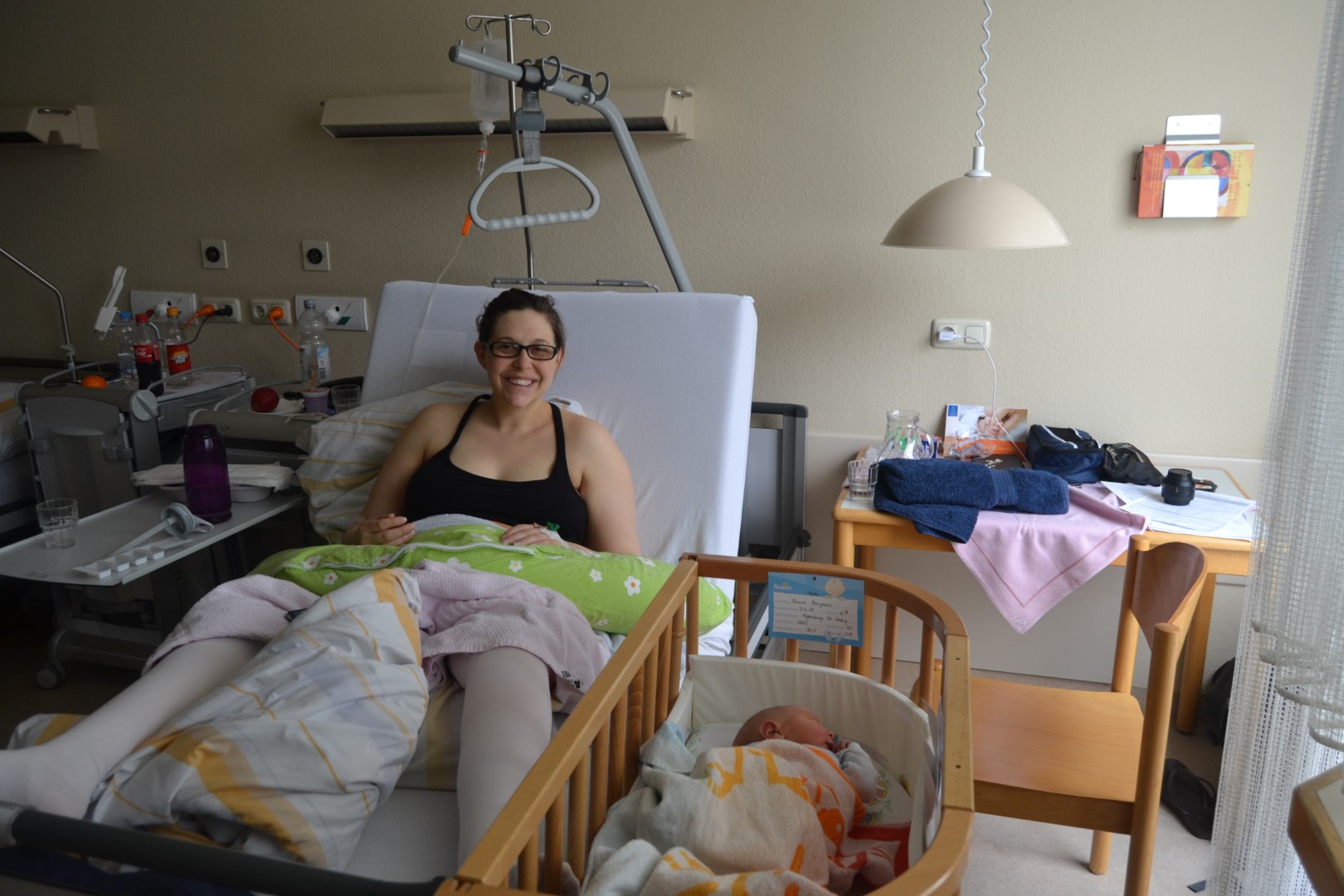
This is something to ask at your registration appointment (typically you call the hospital around 32 weeks and schedule this for around 36 weeks). Some hospitals have absolutely EVERYTHING your baby needs, others have minimal stuff. ASK so that you come well prepared. I have a full checklist below for you at the end of this post as well.
Baby Clothes? One thing I was shocked at was they provided clothes for the baby the entire time we were there at my particular hospital (not all hospitals do this).
Diapers: I have heard many moms who have tiny babies say that they only had size 1 diapers in the maternity ward, so if you’ve got a little bitty one who needs a “Newborn” size, you might want to have a pack sitting in the trunk of your car, just in case. (If you are in the NICU, they have smaller sizes)
Pillows and Towels: Obviously, they will have pillows and towels, but I’ve heard quite a few complaints from other moms about these. If you are particular on your pillows, I guess just bring your own? Likewise, you can expect to find a breastfeeding pillow (like a Boppy) but some moms prefer to bring in their own as well.
And finally, I don’t think it matters where in the world you birth at, hospital towels are small and not comfy! If this is an issue with you, have your own packed in your bag.
No Post-Natal Mama Kit: This was a big shocker to me as well, so you will want to ask your hospital specifically what they have for YOU, postpartum. I was really surprised to find things like Dermaplast (or a German equivalent), a peri bottle, and even mesh undies were not provided.
Tip: Create a “Post Partum Kit” for your Baby Registry For Others to Gift To You. Include:
- Stool softeners
- Dermoplast
- Mesh Undies or “Depends”
- Giant (as in HUUGE) pads (there are manypost partum pads available)
- Sitz Bath bucket
- Peri Bottle
- Witch Hazel Pads
You could also buy a premade postpartum kit as well.
How Long Will You Stay At the Hospital?
This is another big difference between the US and Germany. In Germany, they typically encourage mothers and their newborns to stay much longer than they do in the US. Often you’ll see that they recommend:
For a Vaginal Birth: 3-5 Days
For a C-Section: 5-7 Days
Ambulante Geburt: Alternatively, you can inform them at your registration that you would like an “Ambulante Geburt” or “Outpatient Birth” basically. This is perfect for families who want the safety of a hospital birth but want to go home immediately. Therefore, you will be monitored after the birth and if there are no complications, you can be released in about 4 hours later.
However, like ANYTHING birth related, YOU get to make the calls and shots. Even with a C-Section, I was fortunate enough to not have much pain or complications. The hospital was 45 minutes away from home and since my husband couldn’t stay at the hospital for longer than a few hours here and there, it just didn’t make sense for me to stay.
Tip: If you want to leave early, YOU get to make that call! I absolutely had to “fight” to get “released” early. But I made it very clear after 2 days that I was not staying. I told them I was happy to sign any forms releasing them of liability, promised to come back in a few days for a follow up, and said, “Tchuss!” The doctors were not happy (and I know other moms who have had a lot of resistance from the doctors) but it was my body, my baby, and I knew we would be more comfortable (and I was not at risk) at home!
Utilizing a German Hebamme
As I’ve previously mentioned, you’ll be asked numerous times at your appointments if you’ve gotten your Hebamme yet. I actually find these professionals to be more of a post partum service (Yes, many do prenatal care as well) and love that this is a thing in Germany. Your Hebamme is often available to you upwards of 8 weeks and around 12 sessions, depending on your agreement and insurance.
I have a huge personal chip on my shoulder when it comes to postpartum care (mental, emotional, physical) for mothers in the US and find it to be atrocious and really appreciate that there is at least something offered here in Germany for postpartum follow ups (other than just your 6 week appointment). Many of them are covered with your insurance, and those that aren’t are EXTREMELY affordable!
If you have a Hebamme, the German midwife comes right to you at home after you’ve been discharged from the hospital. They’ll do things like check your vitals, help you with breastfeeding (this is a HUGE benefit and service!), help answer any questions you may have about navigating newborn-hood, mental health concerns, and so much more.
Maternity Leave in Germany
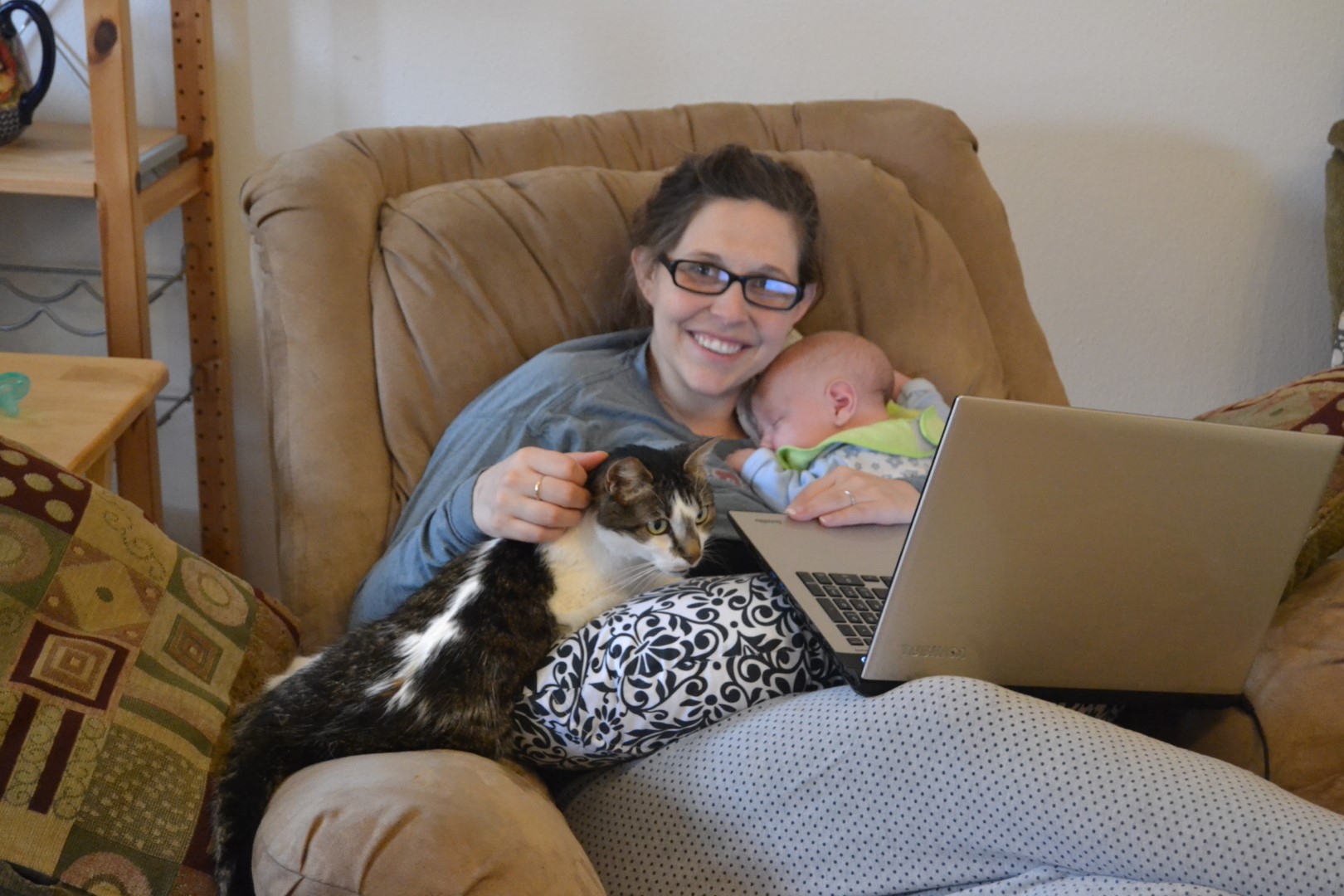
Let’s not even get me started on maternity (and paternity) leave in the US!!!! I’m always in awe of those “crazy communist socialist Germans” 😉 and their amazing healthcare
Anyway, before I really go off the rails on why maternity leave is ESSENTIAL for Mama’s health, let’s turn our focus back to what German Maternity Leave is.
It can get a bit confusing, but at its core, if you are on the German system, you are legally entitled to 14 weeks of paid maternity leave. In fact, you can even start taking it as early as 6 weeks prior to your guess date if you want and then use the remaining 8 weeks after the birth!) This is the bare minimum. Depending on your job, etc most moms will have upwards of 2 years of some sort of paid leave and many have the option to still get their job back after 3 years.
Here is more info and specific details on your Elternzeit in Germany
Getting Your Birth Certificate From Germany
A question I get asked a ton is if my babies are actually dual or German citizens.
Whether you are an expat or stationed here with the US Military, if your baby is born at a German hospital, they WILL have a German BIRTH CERTIFICATE. But a German birth certificate does not automatically mean that they are German Citizens. It just means they were literally born here. It is not like in the US, where if you are born on American soil (regardless of parents’ citizenship) that the baby gets American citizenship.
Note: The following info is based off of personal experience, please double check with your consulate to get all final details and info.
If you are US Military: You are being “Sponsored” here by the US Government, therefore, your child will only have the German birth certificate and NOT citizenship.
For All Americans: you’ll need to apply for your Consular Birth Abroad. It looks overwhelming but is actually quite easy.
For Expats Married To a German: This may vary on the non- German country’s regulations, but if you are married to a German, your baby should have dual citizenship to both parents’ home countries. However, (at the time of writing this) when the child turns 18, they might have to choose which one to keep.
If Both Parents are Expats: Citizenship in Germany is based on the father of the child if both parents are not German. So, if you are British and if the father is French, they automatically get the French citizenship. If you have been in Germany for more than 7 years, you can apply for German citizenship.
At the hospital, they will help your fill out the forms for the birth certificate and child registration. You’ll be able to pick these up from your local Rathaus in a few weeks.
To Register For Your Child’s Birth in Germany, Be Sure To Have At the Birth:
- Cash (ask at your hospital registration exactly how much you need)
- Both Parents’ Birth Certificates
- Marriage Certificate
- Passports (For Expats, you’ll also need your Residence Permit)
- If Requesting Dual Citizenship, a “Beibehaltungsgenehmigung”
Your German Hosptial Birth Packing List

The “Typical List” of Labor and Birthing Packing List Essentials:
- Form of ID
- Toiletries
- Glasses or Contacts
- Bathrobe or cute Komono Style Wrap or
- A beautiful “Mommy and Baby” matching robe and swaddle
- Breastfeeding Nightgown
- Socks
- Comfortable Clothing
- Nursing Tanks
- Loose fitting, comfy pants (I’m obsessed with these ones. Cute and Insanely Comfortable! Good for C-sections and vaginal births!)
- Cell Phone/ Charger
- Books or a Tablet for watching a show etc (and already downloaded books or movies to the device!)
- Camera (however, there are VERY strict privacy laws in Germany, you need to ask about filming and photos before taking a single one)
- Nursing Bras
- Nursing Pads (Disposable or Reusable)
- Shower Sandals (flip flops)
- Portable Speaker
- Swimsuit (if your hospital has tubs, if you plan on a hospital birth, or would like to be in the shower and want coverage)
- Your Birth Plan
- A “Going Home” outfit for baby
Things You’ll Want For Your Birth in Germany
- Mutterpass
- Use a toiletries bag (especially if you are sharing a room with another mom, that way your stuff is neat and tidy)
- Cooler: If you want ice, you’ll need to bring your own! (Electric Coolers are PERFECT since you don’t know how long you’ll need stuff cold)
- A Fan
- 220 Cord Adapters (if applicable)
- Pillow
- Towel
- Your Own Post Partum Kit
- Still Water
- Water Bottle (I prefer ones during birth that have a straw for quick sipping and ones that are “stay cold long” kind of bottles, like this one)
- Lots of Snacks and Food
- Passports
- Marriage Certificate
Words to Get to Know:
If you speak German, then again, this really isn’t an issue, but there are a few good words to have in your back pocket during your pregnancy in Germany.
Swanger: Pregnant
“Ich bin Schwanger.”
Mutterpass: Motherpass (the document/small booklet that you will consider your holy grail!)
“Es tut mir so leid, ich habe heute meinen Mutterpass vergessen!” (I’m so sorry, I forgot my Motherpass today!) <– Don’t do this! 😉
Frauenarzt: Literally, “Lady Doctor”
“Spricht die Frauenartz Englisch?” (Does the OBGYN speak English?)
Krankenhaus : Hospital
Hebamme: Midwife
“Ich brauche eine Hebamme” (I need a midwife)
Geburt: Birth in German (there are many times you’ll see Geburt, such as Geburtzhaus, Gerburtztag, Geburtsverlauf (labor) etc)
Other words you might want to know or will hear:
Ultraschall: Ultrasound
Schmerzen: Pain (You can always say, “Schmerzen” and then point to where you are having discomfort)
Have You Given Birth in Germany? What tips would you give to a mom having a baby in Germany for the first time?








